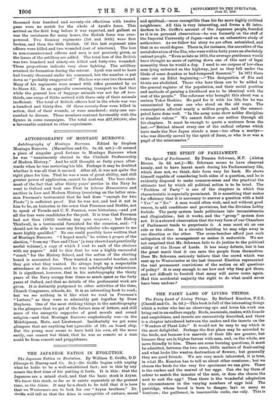THE JAPANESE NATION IN EVOLUTION.
The Japanese Nation in Evolution. By William E. Griffis, D.D (George G. Harrap and Co. 6s.)—Dr. Griffis begins with urging what he holds to be a well-established fact; nor is this by any means the first time of his putting it forth. It is this : that the Japanese are a mixed stock, and that the basic stock is Aryan. We know this stock, so far as it exists separately at the present time, as the Ainns. It may be a shock to be told that it is here that we Westerners are to look for our "Aryan brothers." Dr. ariffis will tell us that the Ainu is susceptible of culture, moral and spiritual,—more susceptible than his far Mere highly civilised neighbours. All this is very interesting, and forms a fit intro. duction to Dr. Griffis's account of the Japanese people, founded as it is on personal observation—he was formerly on the staff of the Imperial University of Japan-.-and on an exhaustive study of authorities. As we follow his story we are often astonished, and that in no small degree. There is, for instance, the narrative of the social elevation of the Eta, who were within forty years an absolutely outcast people. "Even as late as 1870, the average gentleman would have thought no more of cutting down one of this sort of legal nonentity than he would a dog. I used to see corpses of low-class men lying unburied on the highway, just as they fell under the blade of some drunken or bad-tempered Samurai." In 1871 there came out an Edict beginning :—" The designation of Eta and hi-nin are abolished. Those who bore them are to be added to the general register of the population, and their social position and methods of gaining a livelihood are to be identical with the rest of the people." The reformer who brought this about was a certain Yokoi Heshiro. He paid for it with his life, for he was assassinated by some one who stood on the old ways. The emancipation affected nearly a million people, and the emanci- pated have done well. "In the army none show nobler discipline or steadier valour." We cannot follow our author through all his chapters. It must be enough to quote a sentence from the last :—" Behind almost every one of the radical reforms which have made the New Japan stands a man—too often a martyr— who was directly moved by the spirit of Jesus, or who is or was a pupil of the missionaries."






















































 Previous page
Previous page